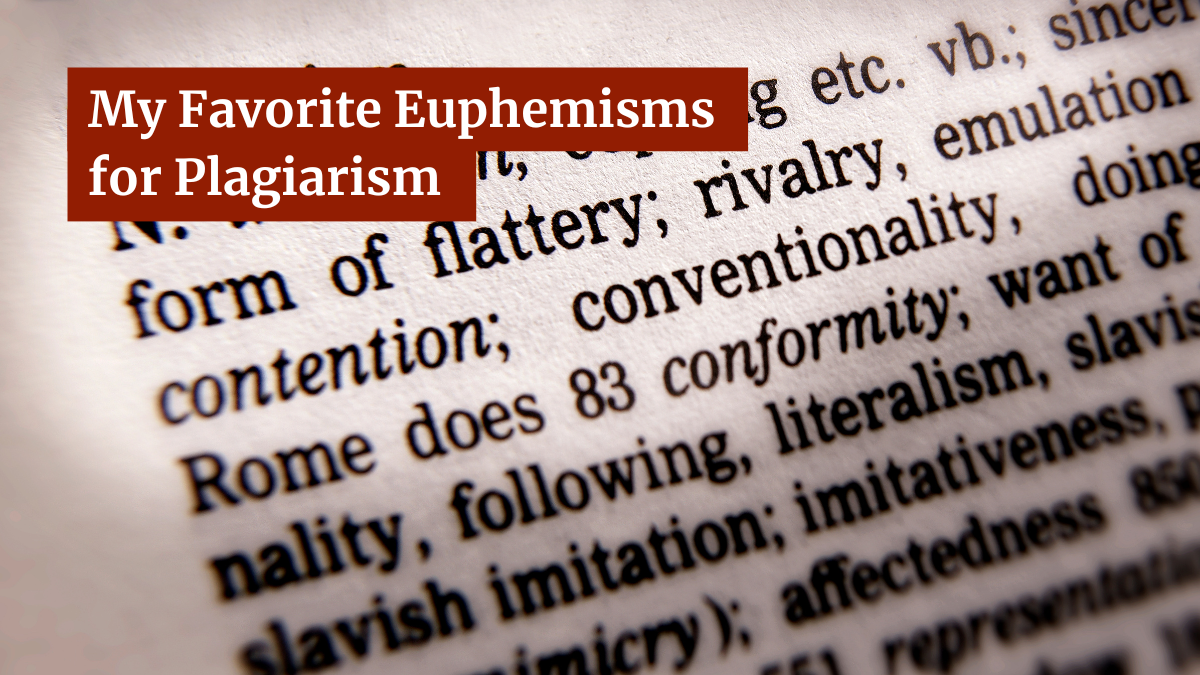My Favorite Euphemisms for Plagiarism

Plagiarism is an ugly word.
To accuse some of plagiarism is to, fundamentally, accuse them of a lie. Essentially, you are saying that they misrepresented a work as their original creation when, in fact, it wasn’t.
This is why plagiarism is so commonly a weapon used against politicians, celebrities and other divisive public figures. The mere mention of the word can ruin careers, tarnish reputations and create public outcry.
To be clear, plagiarism as a topic is far more complicated than that. Many acts of plagiarism don’t have an intent to deceive but come about due to sloppy writing, formatting mistakes and other errors. Plagiarism, ultimately, is a spectrum of misdeeds ranging from minor mistakes to severe fraud.
However, that doesn’t change the fact that the word plagiarism is a powerful word. On one hand, this means people are often quick to use it when it doesn’t apply, but, on the other, it causes people to avoid using it at all costs, no matter how appropriate it is.
Nowhere is this more evident than in the world of scientific research. Journals will often go to great lengths to avoid using the p-word when discussing why articles were retracted or corrected. Sometimes those euphemisms can get extremely creative and entertaining.
Fortunately, Adam Marcus and Ivan Oransky have been running the excellent blog Retraction Watch since 2010. The site covers research misconduct, retractions and other elements from the research process.
As part of that, they’ve been highlighting the many euphemisms journals have used over the past decade plus to avoid saying the word “plagiarism”. They’ve neatly tabulated the list of plagiarism euphemisms on their site via a tag, and even highlighted the “euphemism parade” in 2015 article.
With that in mind, I’m going to go back and look at some of my personal “favorite” euphemisms for plagiarism that Retraction Watch found and why they are so extremely entertaining.
Note: I want to give a big thanks to Ivan Oransky, not only for co-running Retraction Watch and providing the amazing service that blog does, but also for pointing me to links to make collating this list much easier and faster, including a now-offline article that’s available via the Wayback Machine.
1: “Contains passages from a published article without proper attribution and acknowledgement as if they were original”
This one comes from the International Journal of Medicine and Biomedical Research and is in a category of euphemisms that I refer to as “We don’t want to say ‘plagiarism’, so we’ll just repeat the definition of plagiarism”.
This includes other gems such as, “certain parts/portions of the article have been published elsewhere and were not appropriately referenced”, “contains language from already published sources without using proper citation methods” and “inadequate procedural or methodological practices of citation or quotation” to highlight three other examples.
These aren’t just transparent euphemisms for plagiarism, they’re way more awkward to say/read and much less clear. It would be better in every way just to use the p-word and move on. Yet, that is what journals repeatedly refuse to do.
2: A “significant originality issue”
This one comes from the journal Landslides and is the category I call “plagiarism synonyms”. Though all euphemisms are synonyms to some degree, here the journals are trying to avoid saying plagiarism by finding a quick substitute for it.
Other great examples include, “unattributed overlap”, “improper citation methods” and “misappropriate other persons’ material.”
These are all euphemisms that could come straight out of a thesaurus and only really serve to avoid using the word “plagiarism” even though it’s likely the clearest and most common word used for the behavior.
3: “An honor mistake”
This is the most recent one and the one that inspired this article. It’s from the Journal of STEPS for Humanities and Social Sciences. I refer to this as the “Not plagiarism” euphemism, meaning that the term doesn’t actually describe plagiarism, at least not plagiarism alone.
Another notable example of this includes “administrative error”, which was used by the journal Educational Research.
These are perhaps the most egregious because they not only awkwardly avoid using the word plagiarism, but don’t actually make it clear that it’s a plagiarism, attribution or citation issue. An honor mistake can include a wide variety of misdeeds including failing to disclose a conflict of interest, data manipulation and much more.
4: “Unintended excessive reuse of the text”
This is from the journal Rejuvenation Research and is what I call the “Focus on the intent” euphemism. Other examples include, “inadverttently copied text” and “certain parts/portions of the article have been published elsewhere and were not appropriately referenced. The situation is due to honest error…”.
This may be the most understandable. There is a real reason to acknowledge when plagiarism is not the result of deliberate fraud. This can have an impact on the studies and later papers that cited the retracted or corrected work. While such cases of accidental plagiarism still point to integrity issues, in particular with the due diligence of the writing process, it may not be as large of an issue for the underlying science.
However, there’s also nothing stopping journals from calling it “unintentional plagiarism” or “accidental plagiarism”. These are still examples of journals trying to avoid using the dreaded p-word, even when it does apply.
5: “Were flagged for high iThenticate scores”
Finally, I wanted to highlight this one from Pediatrics in Review in 2017. It involved the retraction of two previous papers who, when submitted, were not run through iThenticate since the journal didn’t have access to it. However, after the journal did get access, they were run through retroactive after a later paper raised suspicions.
While I would be willing to treat this as simply an explainer of how the plagiarism was discovered, the journal used multiple other euphemisms for plagiarism including “citation and attribution errors” and that the papers had a “high similarity index”.
It’s a rare example of retractions using multiple euphemisms for plagiarism without ever using the word itself. Still, I don’t want to beat up on this journal too hard as, despite their weak language, they did ultimately do the right thing and independently investigate the previous articles.
As we keep seeing, a lot of journals wouldn’t do that.
Bottom Line
To be clear, the problem isn’t plagiarism euphemisms themselves. I’ve used words like “overlap”, “copied text”, “similarity” and so forth many, many times on this site, often to avoid saying the word “plagiarism” too many times in a paragraph or article.
The problem arises when the euphemisms are there to avoid saying “plagiarism” at all. This is especially disconcerting when its journals doing it as part of their retracitons, when they are supposed to be telling an objective truth about why the work has been retracted.
However, it’s interesting that, in a time where so many people are quick to use the word “plagiarism” or “plagiarist” when it doesn’t really apply, journals often bend over backwards to avoid saying it at all.
It’s an interesting contrast and one that academia will likely need to address, especially as their work is drawing increased public attention.
Simply put, the work of academia isn’t as insular as it once was and that can create problems, especially for those who shy away from using the word plagiarism when it is fully appropriate.
Want to Reuse or Republish this Content?
If you want to feature this article in your site, classroom or elsewhere, just let us know! We usually grant permission within 24 hours.
